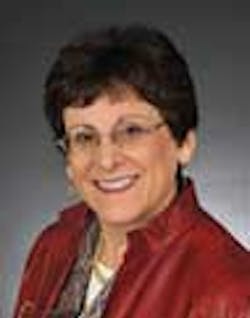ANOTHER 'VIEW' OF DENTAL HYGIENE
BY JOANN R. GURENLIAN, RDH, PHD
If you have not seen or heard about this, the women of the television program, "The View," recently had a guest on the show who caused quite a stir among dental hygienists. Regina Lewis, a financial expert, presented information about jobs affected by the economy. She noted that architects were not doing well due to the housing market. Cosmetic surgery and legal jobs were examples of other areas negatively impacted by the economy. Jobs markets doing quite well included health care (hospitals and home care agencies), retail within companies reporting growth (Macy's, Chipolte restaurants), and communications (AT&T wireless stores).
What caused concern among dental hygienists was the next part of the segment. Ms. Lewis stated that one of the best jobs right now that did not require a college degree was dental hygiene. Oh, my.
After this segment was aired, the producers heard from many dental hygienists. The ADHA president and executive director indicated that offense was taken by the fact that Ms. Lewis did not do her homework and reported inaccuracies in her presentation. The ADHA response and video clip of the segment can be accessed at www.adha.org.
After hearing from so many dental hygienists, "The View" issued the following response"
"On July 6th, 2012, during a segment called 'Who's Hiring Now,' our expert reported that dental hygienists do not need a college degree and that the average salary is $45,000 annually. Since this report aired, we have received complaints from some dental hygienists and have been in a continuing dialogue with the American Dental Hygienists' Association. We are now told that of the 334 entry-level dental hygiene programs in the United States, 290 of them award their graduates an associate's degree, 53 award their graduates a baccalaureate degree, and some offer both degrees. Also, there are twenty programs that offer a master's degree in dental hygiene or related health sciences. In addition, the salary we gave was the average starting salary. In 2010, the median salary for a dental hygienist was $68,250 annually. We regret any confusion."
ADHA then sent ABC a follow-up letter clarifying that the statement posted by "The View" was still inaccurate in that dental hygienists are required in 49 states to graduate from an accredited dental hygiene program in order to become licensed. The point they were trying to solidify was that dental hygienists don't just "generally" attend a college program; they must do so.
I have to say that I was more than a little annoyed by the segment. However, what really got me was when Ms. Lewis described that a dental hygienist "only cares if I use this tool on that tooth," and intimated that it does not matter what degree one has. For me, I was appalled that we are viewed as not caring about what we do or that there is no thought needed other than knowing where to place our instruments. For many, it seems as though they stopped listening when dental hygienist was mentioned as a great job for persons without college degrees. If you look at the whole picture, our image could not have been more diminished. And, no one seemed to find that offensive!
Think about it. Do your patients perceive you as not caring or thinking about what you are doing? Does the public think so little of us that they only see as using our brains when we try to figure out what tool goes on which tooth? Does this not make you wonder why our image keeps taking low blows?
This is a critical issue for dental hygienists and the profession to address. Apparently telling the story of education does not really have the profound impact one would hope to achieve. Despite the best public relations efforts, we are not getting out the word that we are as important as other health care professionals. While some view us as robotic, we perceive ourselves as caring providers who consciously think about the dental hygiene process of care (assessment, diagnosis, treatment planning, implementation, evaluation, and documentation) while we are working with our patients. We strive to identify appropriate preventive and therapeutic approaches that will best serve each person's needs. Yet, once again, we have been reduced to non-thinking teeth cleaners.
It is time we examine this issue as individuals and as a collective body. We cannot allow others to continue to have this perception that we are robots and the cleaning person of the mouth. We must decide how to present ourselves to the public and other health care providers so that they fully understand who we are and what we do. We must stop trying to simplify our role in health care because we think that people will not understand what dental hygiene means.
Image is important. This television segment clearly demonstrates how important our image is. It is easy to misinterpret and misrepresent. Let us hold ourselves accountable for changing our image so we can be recognized as the health professionals we truly are.

